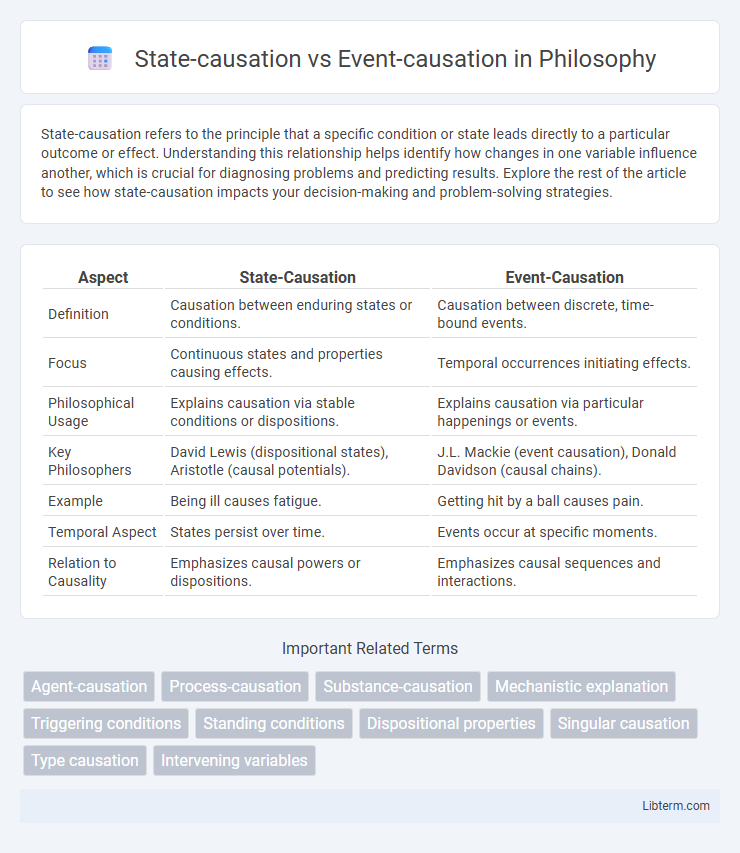State-causation refers to the principle that a specific condition or state leads directly to a particular outcome or effect. Understanding this relationship helps identify how changes in one variable influence another, which is crucial for diagnosing problems and predicting results. Explore the rest of the article to see how state-causation impacts your decision-making and problem-solving strategies.
Table of Comparison
| Aspect | State-Causation | Event-Causation |
|---|---|---|
| Definition | Causation between enduring states or conditions. | Causation between discrete, time-bound events. |
| Focus | Continuous states and properties causing effects. | Temporal occurrences initiating effects. |
| Philosophical Usage | Explains causation via stable conditions or dispositions. | Explains causation via particular happenings or events. |
| Key Philosophers | David Lewis (dispositional states), Aristotle (causal potentials). | J.L. Mackie (event causation), Donald Davidson (causal chains). |
| Example | Being ill causes fatigue. | Getting hit by a ball causes pain. |
| Temporal Aspect | States persist over time. | Events occur at specific moments. |
| Relation to Causality | Emphasizes causal powers or dispositions. | Emphasizes causal sequences and interactions. |
Understanding the Foundations of Causation
State-causation refers to a situation where a specific state or condition causes a particular effect, emphasizing the role of enduring circumstances in generating outcomes. Event-causation, on the other hand, involves discrete events triggering subsequent events, highlighting momentary interactions as the foundation of causal chains. Understanding the foundations of causation requires distinguishing between these two, as they shape different approaches in philosophical debates and scientific explanations of how causes produce effects.
Defining State-Causation: Concepts and Characteristics
State-causation refers to causative relationships where a particular state or condition leads to an effect, emphasizing enduring situations rather than discrete occurrences. This concept highlights how continuous mental or physical states, such as beliefs or health conditions, function as causes by maintaining stable influences over time. Key characteristics of state-causation include its reliance on persistent conditions and its role in generating outcomes through sustained, rather than momentary, causal forces.
Unpacking Event-Causation: Meaning and Mechanics
Event-causation involves understanding how one event directly brings about another through a chain of occurrences, emphasizing temporal sequences and causal links. The mechanics rely on identifying cause-effect relationships where antecedent events generate consequent events, often analyzed in terms of necessity and sufficiency. This contrasts with state-causation, which considers static conditions as causes rather than dynamic occurrences, making event-causation crucial for explaining changes and processes over time.
Philosophical Roots of State and Event Causation
State-causation traces back to Aristotle's theory of potentiality and actuality, emphasizing continuous conditions or states leading to an effect, whereas event-causation, rooted in Humean philosophy, focuses on discrete occurrences triggering subsequent events. Philosophers like David Lewis further developed event causation through counterfactual dependence, contrasting with state causation's holistic and enduring condition framework. Understanding these divergent origins elucidates ongoing metaphysical debates about causality's nature and temporal structure.
Key Differences: State-Causation Versus Event-Causation
State-causation refers to situations where a particular condition or state brings about an effect, emphasizing ongoing or sustained factors that influence outcomes over time. Event-causation involves discrete occurrences or actions that trigger immediate or specific effects, highlighting the temporal point of causative events. Key differences lie in the temporal scope--state-causation is continuous and stable, while event-causation is instantaneous and isolated.
Illustrative Examples: State vs. Event Causation in Practice
State-causation refers to conditions or states that create the backdrop for certain outcomes, such as poverty causing limited access to education, while event-causation involves specific occurrences triggering an effect, like a factory fire leading to production delays. In practice, state-causation explains ongoing systemic issues, whereas event-causation highlights discrete incidents with immediate impacts. For example, chronic unemployment (state) may result in increased crime rates over time, whereas a sudden economic recession (event) can cause an abrupt spike in job losses.
The Significance of Causation Types in Scientific Inquiry
State-causation emphasizes the role of stable conditions or states in bringing about effects, while event-causation focuses on specific occurrences triggering changes. Scientific inquiry benefits from distinguishing these types by enabling precise analysis of phenomena, where state-causation explains persistent influences and event-causation accounts for discrete interactions. This differentiation enhances the clarity of causal models and improves the accuracy of experimental design and hypothesis testing in diverse disciplines.
Implications for Law, Psychology, and Social Sciences
State-causation refers to the influence of enduring conditions or states on behavior, while event-causation emphasizes discrete incidents as causal factors, shaping legal accountability and psychological assessment frameworks. In law, state-causation supports arguments about consistent behavioral patterns affecting intent and responsibility, whereas event-causation aligns with pinpointing specific actions leading to an outcome, impacting prosecution and defense strategies. Social sciences utilize these distinctions to analyze human behavior, with state-causation highlighting systemic and environmental influences and event-causation focusing on momentary triggers, informing policy design and intervention programs.
Contemporary Debates and Challenges in Causation Theory
Contemporary debates in causation theory emphasize the distinction between state-causation, where causation is attributed to persistent conditions or states, and event-causation, which focuses on discrete occurrences triggering effects. Challenges arise in accurately modeling causal relationships in complex systems, as state-causation often involves continuous or overlapping influences, while event-causation demands precise temporal and ontological definitions. Researchers continue to refine causal frameworks to address issues like causal overdetermination, the granularity of causative factors, and their implications for scientific explanation and metaphysical analysis.
Future Directions: Bridging State and Event Causation
Emerging research aims to bridge state-causation and event-causation by developing integrated models that capture both continuous conditions and discrete incidents influencing outcomes. Advanced computational frameworks leverage machine learning to analyze temporal dynamics, enabling a nuanced understanding of causality in complex systems. Future directions emphasize interdisciplinary approaches combining philosophy, cognitive science, and artificial intelligence to refine causal inference methodologies.
State-causation Infographic

 libterm.com
libterm.com